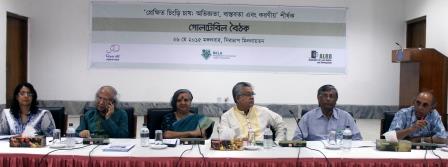Roundtable on Shrimp farming: experience, reality and actions
A roundtable on Shrimp farming: experience, reality and actions was organized jointly by Nijera Kori, Bangladesh Environmental Lawyers Association and Association of Land Reform and Development on 26 May 2015 at CIRDUP auditorium in Dhaka.
Findings of a research conducted jointly by Kasia Paprocki, Ph.D. candidate of Department of Development Sociology, Cornell University and Jason Cons, Research Assistant Professor, Lyndon & Johnson School of Public Affairs, University of Texas were presented in the roundtable.
In their presentations, Kasia and Jason highlighted the social and environmental impacts of shrimp farming in the south western region, i.e. Khulna district, of Bangladesh. Due to increasing salinity in the soil, verdant lands have been degraded to stagnant brackish water. Vegetation have been destroyed, cultivation of crops, homestead horticulture farming have become impossible, trees are dying, livestock feed is in crisis. People’s livelihood has greatly hampered due to all of these.
As regards the employment of the poor peasants, they found in the process of their research, that only between one-tenth and one-hundredth of agricultural land workers are required in the shrimp farming. So the poor peasants have lost work and income.
Peasants of that area were organized and started procession demanding the local land to be freed from shrimp cultivation which is destroying their livelihood and the environment.
National Shrimp Policy, 2014 and its drawbacks were discussed by Syeda Rizwana Hasan, Chief Executive, Bangladesh Environmental Lawyers Association. She said that the High Court Division of the Supreme Court of Bangladesh delivered a verdict against a writ petition and directed all the relevant agencies to protect the environment and to conduct environmental impact assessment before starting shrimp farming in any area or land. The court took the respective verdict from an Indian court into cognizance and followed suit in 2012.
She mentioned that the though National Shrimp Policy, 2014 was passed about 2 years after the delivery of the High Court verdict in 2012, the policy almost totally violated the spirit of the verdict. She urged the government to scrap the present shrimp policy and formulate new policy following the verdict of the High Court of Bangladesh.
Other speakers like Prof. Anu Mohammad said that the foreign currency earnings from shrimp exports must not be more than the value of damage done to the environment, vegetation and people’s livelihood.
The roundtable was chaired by Khushi Kabir, Coordinator of Nijera Kori and Chairperson of ALRD. She emphasized the need of a uniform Family Law for everyone irrespective of religious affiliations.





